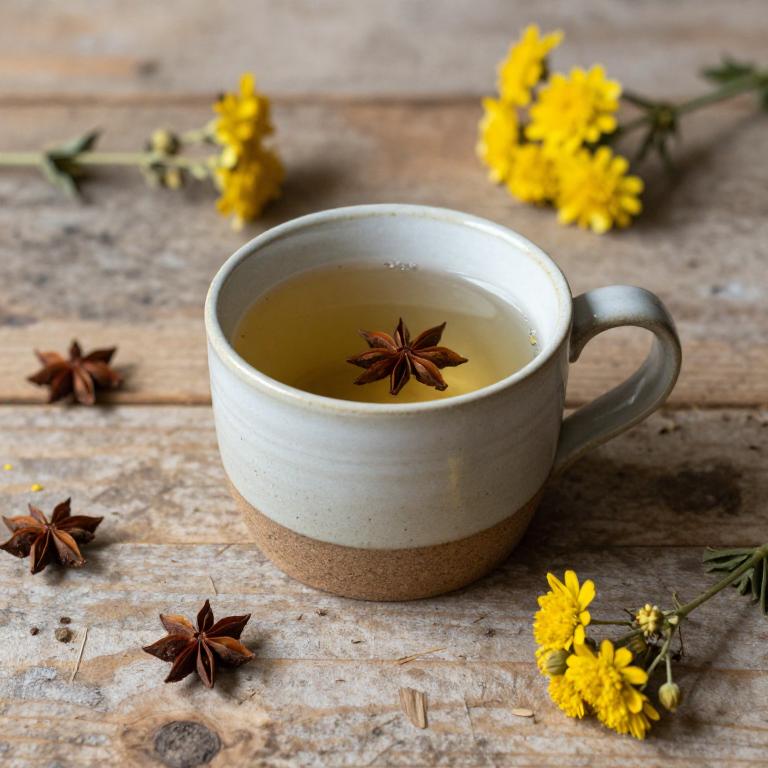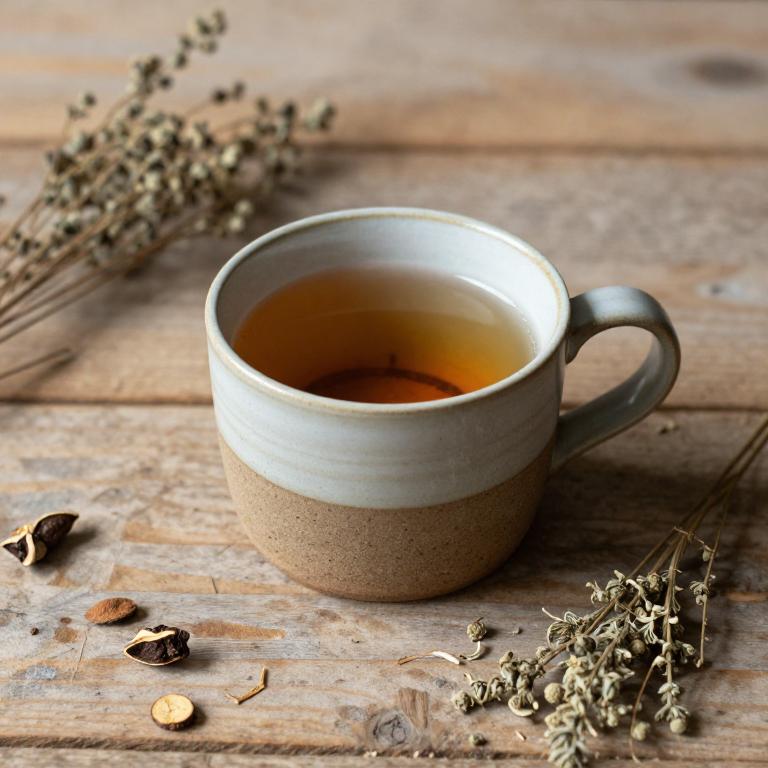10 Best Herbal Teas For Irritable Bowel Syndrome

Herbal teas can be a beneficial complementary therapy for individuals with irritable bowel syndrome (IBS), as certain herbs are known to soothe the digestive system and reduce symptoms such as bloating, gas, and cramping.
Chamomile, peppermint, and fennel are commonly recommended for their calming effects on the gut, helping to relax the muscles of the intestines and ease discomfort. These teas are generally safe for most people, though individuals with allergies or specific health conditions should consult a healthcare provider before use. They can be consumed regularly as part of a holistic approach to managing IBS, often alongside dietary adjustments and stress-reduction techniques.
While herbal teas are not a cure, they may offer significant relief and contribute to improved quality of life for those living with IBS.
Table of Contents
- 1. Camellia (Camellia sinensis)
- 2. Fennel (Foeniculum vulgare)
- 3. Chamomile (Matricaria chamomilla)
- 4. Thistle (Silybum marianum)
- 5. Cumin (Cuminum cyminum)
- 6. Stinging nettle (Urtica dioica)
- 7. Ginger (Zingiber officinale)
- 8. Anise (Pimpinella anisum)
- 9. English lavender (Lavandula angustifolia)
- 10. Ceylon cinnamon (Cinnamomum verum)
1. Camellia (Camellia sinensis)

Camellia sinensis, the plant from which green and black teas are derived, contains bioactive compounds such as polyphenols and caffeine that may influence gastrointestinal function.
Some studies suggest that these compounds could have a mild anti-inflammatory effect, potentially benefiting individuals with irritable bowel syndrome (IBS). However, the impact of Camellia sinensis herbal teas on IBS varies among individuals due to differences in tolerance to caffeine and other components. While some people may find relief from symptoms like bloating or constipation, others may experience worsened symptoms due to caffeine sensitivity.
As a result, it is advisable for IBS patients to consult with a healthcare provider before incorporating Camellia sinensis herbal teas into their routine.
2. Fennel (Foeniculum vulgare)

Foeniculum vulgare, commonly known as fennel, is a popular herbal remedy used in teas to support digestive health, particularly for individuals with irritable bowel syndrome (IBS).
The seeds of the fennel plant contain compounds like anethole, which have antispasmodic and carminative properties that can help alleviate symptoms such as bloating, gas, and cramping associated with IBS. Fennel tea is often consumed after meals to promote digestion and reduce discomfort in the gastrointestinal tract. Its mild, sweet flavor makes it a palatable and easy-to-integrate option for those seeking natural relief from IBS symptoms.
However, it is advisable to consult a healthcare provider before using fennel tea, especially for individuals with known allergies or existing medical conditions.
3. Chamomile (Matricaria chamomilla)

Matricaria chamomilla, commonly known as chamomile, is a popular herbal tea often used for its calming and digestive benefits.
Studies suggest that chamomile may help alleviate symptoms of irritable bowel syndrome (IBS) by reducing inflammation and spasms in the gastrointestinal tract. The active compounds in chamomile, such as apigenin and bisabolol, are believed to have antispasmodic and anti-inflammatory properties that support gut health. While research is ongoing, many individuals with IBS report improved digestion and reduced bloating after regular consumption of chamomile tea.
As a natural remedy, chamomile tea is generally considered safe for most people, though it should be used in conjunction with medical advice for optimal results.
4. Thistle (Silybum marianum)

Silybum marianum, also known as milk thistle, is a herbal remedy that has gained attention for its potential benefits in managing symptoms of irritable bowel syndrome (IBS).
The active compound, silymarin, is believed to have anti-inflammatory and antioxidant properties that may help reduce gut inflammation and improve digestion. Some studies suggest that silybum marianum herbal teas could support liver function, which in turn may positively influence digestive health. However, while preliminary research is promising, more clinical trials are needed to confirm its efficacy for IBS specifically.
As with any herbal remedy, it is important to consult a healthcare provider before incorporating silybum marianum into a treatment plan for IBS.
5. Cumin (Cuminum cyminum)

Cuminum cyminum, commonly known as cumin, has been traditionally used in herbal teas to support digestive health, including for individuals with irritable bowel syndrome (IBS).
The essential oils in cumin, such as limonene and alpha-pinene, possess carminative and anti-spasmodic properties that may help alleviate symptoms like bloating, gas, and cramping associated with IBS. Some studies suggest that cumin can enhance gastrointestinal motility and reduce inflammation in the digestive tract, potentially offering relief for IBS patients. However, while anecdotal evidence and preliminary research support its use, more clinical trials are needed to confirm its efficacy and safety for long-term IBS management.
When consumed as a herbal tea, cumin is generally safe in moderate amounts, though individuals with sensitive digestive systems should start with small quantities to avoid potential irritation.
6. Stinging nettle (Urtica dioica)

Urtica dioica, commonly known as stinging nettle, has been explored as a potential herbal remedy for individuals suffering from irritable bowel syndrome (IBS).
This plant contains various bioactive compounds, including antioxidants, anti-inflammatory agents, and minerals, which may help alleviate digestive discomfort and reduce inflammation in the gastrointestinal tract. Some studies suggest that stinging nettle tea may aid in regulating gut motility and reducing symptoms such as bloating and cramping in IBS patients. However, more research is needed to fully understand its efficacy and safety for long-term use.
As with any herbal remedy, it is important to consult a healthcare provider before incorporating urtica dioica into an IBS management plan.
7. Ginger (Zingiber officinale)

Zingiber officinale, commonly known as ginger, has been widely used in herbal teas to support digestive health, particularly for individuals with irritable bowel syndrome (IBS).
The active compounds in ginger, such as gingerol and shogaol, possess anti-inflammatory and antispasmodic properties that may help alleviate common IBS symptoms like bloating, cramping, and abdominal pain. Drinking ginger tea can stimulate digestion and reduce nausea, making it a soothing option for those experiencing digestive discomfort. However, it is important to note that while ginger is generally safe, some individuals may experience gastrointestinal irritation, so it is advisable to start with small amounts.
Overall, ginger herbal tea can be a natural and effective complementary approach to managing IBS symptoms when used as part of a holistic treatment plan.
8. Anise (Pimpinella anisum)

Pimpinella anisum, commonly known as anise, is a herbal remedy that has been traditionally used to support digestive health.
Its essential oils, particularly anethol, possess mild carminative and antispasmodic properties that may help alleviate symptoms of irritable bowel syndrome (IBS), such as bloating, cramping, and gas. When brewed into a soothing herbal tea, anise can promote gentle digestion and ease gastrointestinal discomfort. However, it is important to consult a healthcare provider before using anise tea, especially for individuals with existing medical conditions or those taking medications.
While anise tea may offer some relief for IBS symptoms, it should not replace professional medical advice or treatment.
9. English lavender (Lavandula angustifolia)

Lavandula angustifolia, commonly known as English lavender, has been explored as a potential herbal remedy for individuals suffering from irritable bowel syndrome (IBS).
Its calming properties may help reduce stress, a known trigger for IBS symptoms, thereby offering indirect relief. Some studies suggest that lavender essential oils and extracts may have anti-inflammatory and antispasmodic effects that could soothe gastrointestinal discomfort. While more research is needed, lavender tea is often considered a gentle and safe option for those seeking natural relief from IBS-related symptoms.
When consumed as a herbal tea, lavender may promote relaxation and potentially ease digestive distress in a calming manner.
10. Ceylon cinnamon (Cinnamomum verum)

Cinnamomum verum, commonly known as true cinnamon, has been explored for its potential benefits in managing symptoms of irritable bowel syndrome (IBS).
The essential oils and compounds found in cinnamon, such as cinnamaldehyde and eugenol, may help reduce inflammation and improve gut motility, which are key factors in IBS. Some studies suggest that cinnamon can have a calming effect on the digestive system, potentially alleviating cramping and bloating. However, while preliminary research is promising, more clinical trials are needed to confirm its efficacy and safety for IBS patients.
As with any herbal remedy, it is advisable to consult a healthcare provider before incorporating cinnamon tea into a treatment regimen for IBS.